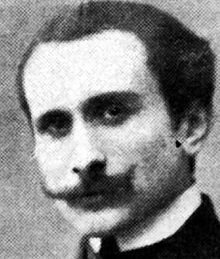Jovan Skerlić
| Jovan Skerlić | |
|---|---|
 |
|
| Born |
20 August 1877 Belgrade, Principality of Serbia |
| Died | 15 May 1914 (aged 36) Belgrade, Kingdom of Serbia |
| Occupation | Writer and critic. |
Jovan Skerlić (Serbian Cyrillic: Јован Скерлић, Serbian pronunciation: [jɔ̌ʋan skɛ̂ːrlitɕ]) (20 August 1877 – 15 May 1914) was a Serbian writer and critic. He is regarded as one of the most influential Serbian literary critics of the early 20th century, after Bogdan Popović, his professor and early mentor.
It is said that Skerlić revolutionized the Serbian literary scene around the turn of the nineteenth century as a young dashing critic, historian of literature, politician and polemicist. Although he died relatively young (he was 37), Skerlić still managed to complete an impressive body of work that linked criticism and literary history. According to his biographer, he became interested in the socialism advocated by Vaso Pelagić and Svetozar Marković as a very young man. At sixteen Skerlić began writing for the Zanatlijiski savez ("The Craftsmen Union", 1893). In 1895, he began to contribute his writings to various newspapers, such as Socialdemokrat, Radničke novine, and Delo. At the university in Belgrade, he studied history and French philology. He received an excellent post-graduate education at Belgrade's Grandes Écoles (his professor and mentor was Bogdan Popović) before embarking on a graduate program abroad at the universities of Lausanne, Paris and Munich. He completed his doctorate in French Literature in Lausanne in 1901. After three years of post-graduate research in Paris and Munich, he returned in 1904 to Serbia, where he taught French and French Literature at the Grandes Écoles where he had been educated before becoming professor of Serbian Literature at the same institution (when the University of Belgrade was established) the following year. Skerlić was a member of the Skupština (Serbian Parliament), and founder and editor of several literary periodicals. His political sympathies made him an ally of the Serbian socialist Svetozar Marković, whose posthumous biography Skerlić came to write. Skerlić always insisted on the parallel between Svetozar Marković and Dositej Obradović, seeing in the former a reincarnation of the latter: "This young man's role in our public life in the nineteenth century was the same as that of the ex-monk Dositej Obradović at the end of the eighteenth century...."
...
Wikipedia
